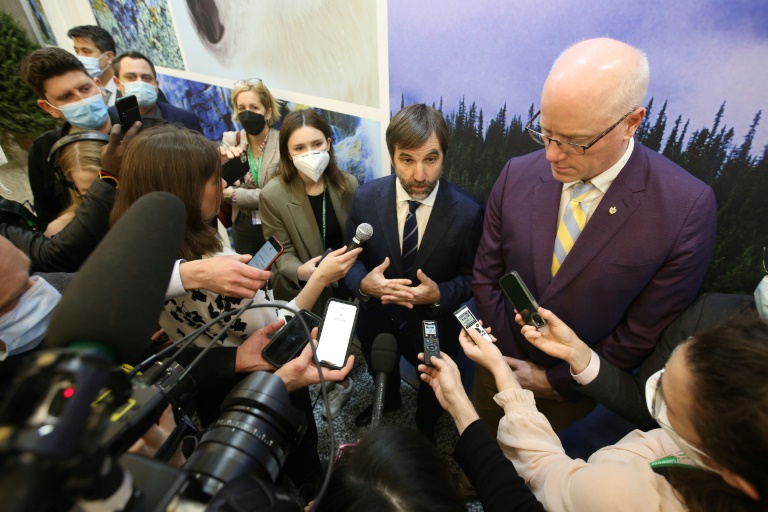Canadian Minister of the Environment and climate change Steven Guilbeault speaks to media during the United Nations Conference of the Parties (COP15) in Montreal
Hopes of sealing a historic “peace pact with nature” at a United Nations biodiversity summit hang in the balance as the world’s environment ministers began the final phase of high-stakes talks on Thursday.
Stark divisions remain to be bridged, foremost among them the subject of how much developed countries will pay developing nations to help them save ecosystems, and whether there should be a new, dedicated fund for this purpose.
At stake is the future of the planet and whether humanity can roll back habitat destruction, pollution and the climate crisis, which are threatening an estimated million species with extinction.
The draft agreement contains more than 20 targets, including a cornerstone pledge to protect 30 percent of the world’s land and seas by 2030, as well as goals to eliminate harmful fishing and agricultural subsidies, tackle invasive species and reduce pesticides.
“A sound ecosystem is essential for the prosperity of civilization,” Chinese President Xi Jinping said in a video message that opened the high-level segment.
“We must work together to promote harmonious coexistence between man and nature.”
China is chairing the summit but is not hosting because of its strict Covid rules, leaving Canada to step in and hold the meeting in Montreal, one of North America’s coldest cities, in deep winter.
“A brilliant Canadian artist, Joni Mitchell, sent us a message in a song — that we have ‘paved paradise and put up a parking lot,'” said Canada’s environment minister, Steven Guilbeault, who was once a radical activist nicknamed “Green Jesus.”
“We listened to her music and sang along but didn’t really understand her message. We must live in harmony with nature, not try and dominate it,” he added.
In the absence of heads of state and government, more than a hundred ministers will have to drag the text, four years in the making, over the finish line.
But its success is still far from assured after disagreements over the thorny issue of biodiversity financing led to a walkout by negotiators from developing nations overnight Tuesday and a temporary pause in talks.
– New fund sought –
The Global South, home to most of the world’s biological diversity, wants a new global biodiversity fund (GBF) to help them meet goals, for example by setting up protected areas.
But rich countries are opposed — and propose instead making existing financial mechanisms more accessible.
This debate mirrors a similar disagreement during recent UN climate talks in Egypt on creating a “loss and damages” fund for the most climate-vulnerable nations — though that demand was eventually met.
Dozens of nations, including Brazil, India, Indonesia and many African countries are also seeking funding of $100 billion yearly, or one percent of global GDP, until 2030.
Current financial flows from high-income countries to lower income ones are in the order of $10 billion per year.
A crisis meeting of heads of delegations, organized on Wednesday by China, which is chairing the meeting, brought negotiators back to the table following the breakdown.
A Western negotiator who declined to be named told AFP: “The African group wants to reach an agreement with money in front, other developing countries too, but Brazil is using the financial question to derail the process.”
The source said the Brazilian delegation is still following the policies of outgoing far-right president Jair Bolsonaro, who is very close to the agricultural industry, which is hostile to reducing pesticide use.
Nevertheless, developing countries are angered by what they see as a lack of ambition.
“This has led to the negotiations now being on the edge of a full breakdown,” said Innocent Maloba of WWF International.
Beyond the moral implications, there is the question of self-interest: $44 trillion of economic value generation — more than half the world’s total GDP — is dependent on nature and its services.









